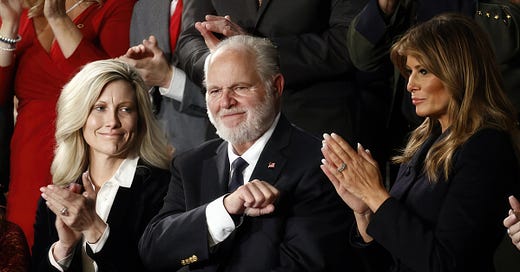

Discover more from @amuse
On October 1, 2020, Rush Limbaugh made a prediction that, even at the time, seemed audacious to many. In an episode titled, "Now You See It: Democrats Want to End Elections," Rush proclaimed that the progressive left had grown weary of the electoral process and would, if given the chance, find a way to do away with genuine elections altogether. This declaration, made just weeks before the 2020 election that ultimately saw President Trump defeated, carried an eerie prescience. And now, with the hindsight of recent events and an ever-deepening understanding of their motivations, we can confidently assert: Rush was right.
Rush's insight, delivered with his characteristically pointed eloquence, resonates more profoundly today than perhaps even at the time of its utterance. It speaks to a fundamental truth that many have conveniently ignored, or worse, have chosen to forget.
Let us then speak plainly. The progressive left, seething beneath the façade of democratic engagement, is weary of seeking public endorsement. They tire not of the process of elections merely, but of the fact that the legitimacy of their power must be conferred by the people they hold in palpable contempt. Such is the condition of the modern elite—an aristocracy of pseudo-intellectuals who genuinely believe that their opinions, their designs for society, should not have to face the rigorous approval of an informed citizenry. Rather, it should be enough that their moral superiority is simply acknowledged, and with that, carte blanche is given for the wholesale restructuring of the social order.
This is not a problem of campaigning but rather one of a deeper existential grievance with democracy itself. They view the need to garner the approval of Americans as an affront, an archaic relic of a bygone era when "the people" were thought to matter. They are resentful—resentful that power should derive from a process as untidy and unpredictable as popular sovereignty. To those who worship at the altar of ideological purity, democracy is merely an inconvenient speed bump on the path to their preferred utopia. Consider the dissonance that accompanies their praise of elections that serve no actual purpose—the likes of Putin’s Russia or, historically, Castro’s Cuba. In these systems, elections are charades designed to simulate popular will without subjecting those in power to the risks that genuine political participation might entail. This, indeed, is the ideal scenario for those who would rather rule by virtue of "moral imperative" than by the consent of the governed.
Rush was, in essence, describing a psychological profile of a movement that seeks power not as a reflection of the popular will but as an entitlement born of intellectual and moral superiority. The progressive left, in its current incarnation, has ceased to be a political faction that wishes to compete in the marketplace of ideas. Instead, it seeks dominion. And dominion is not won by persuasion; it is seized, either by brute force or by manipulating the mechanisms of democracy until they are but hollow echoes of their intended purpose.
Take, for instance, the recent cacophony surrounding electoral reform, wherein proposals like "ranked-choice voting" are introduced—initiatives not to make the process more transparent or more equitable, but rather to obscure it under the guise of complexity. The goal is to erode the simplicity of majority rule, to muddy the waters until they find an advantage. We can also witness an obsessive campaign to undermine voter integrity measures. Opposition to voter ID, incessant litigation to weaken voter verification, and the stretching of election deadlines—all betray an underlying fear: the fear of a truly transparent election process.
Modern Democrats, Rush noted, still go through the motions of campaigning. It’s true; we see the rallies, the photo-ops, the talking heads. But let us scrutinize this kabuki theater. What of Biden’s campaign, in 2020 and again in 2024? In 2020, Biden barely bothered to campaign at all, relying instead on a compliant media and a pandemic-induced strategy of staying largely out of sight. And in 2024, Biden did not even begin to campaign until his disastrous debate performance led to his ouster from the ticket. This is not the behavior of a leader seeking to win over the hearts and minds of the public; it is the behavior of a figurehead who expects victory to be handed to him without the necessity of persuasion. And the Vice President, Kamala Harris—she who bowed out of the 2020 primary without so much as a single vote—has largely refused to give press interviews or answer questions at press conferences. Instead, she has chosen to appear on vapid sex podcasts like "Call Her Daddy" or sit for interviews with friendly supporters like CNN's Dana Bash. This is not engagement; it is insulation from accountability.
Consider also the recent statements by Democrat elites like Hillary Clinton and John Kerry, who have openly argued that free speech is dangerous to our democracy and must be curtailed to protect the country. In two separate interviews, they warned that the freedom to express dissenting opinions poses a threat to the nation—a chilling reminder of how quickly the principles of liberty can be discarded when they become inconvenient. Their sentiments underscore Rush's point: the left does not want to engage in debate; they want to silence opposition, all in the name of safeguarding their vision of progress.
And then there is the recent revelation from Representative Jamie Raskin, who told a group that if Donald Trump is elected in November, Democrats plan to ensure he never takes the oath of office on January 20th. They intend to invoke a twisted interpretation of the 14th Amendment to bar him from office due to his involvement in January 6th—a tactic designed not to honor democracy, but to subvert the will of the people and prevent a duly elected candidate from assuming office.
The lawlessness of the Biden-Harris regime further illustrates the contempt for democratic norms. Ignoring the Supreme Court's ruling that they could not forgive student debt, they have continued to push forward with alternative means of bypassing the decision. They have diverted funds earmarked for FEMA disaster relief to finance their open border policies, prioritizing ideological goals over the wellbeing of American citizens in need. Meanwhile, they pretend to sanction Iran, all while offering $100 billion in waivers—actions that undermine national security while paying lip service to accountability. These are not merely policy disagreements; these are anti-democratic maneuvers that aim to render elections and the people’s voice irrelevant.
The truth, dear readers, is discomfiting but essential: they will continue to "play democracy" only so long as it serves their ambitions. The electorate—the laborer in Ohio, the small-business owner in Texas, the teacher in Iowa—these citizens are to the elites a quaint relic, a footnote in the sweeping saga of the social engineering they aspire to. And so, when Rush proclaimed, in his booming way, that the left ultimately seeks to do away with elections, he was not speaking in hyperbole. He was offering a stark warning—one we ought to heed today, as we see attempts to circumvent the electorate, from legal chicanery in courtrooms to executive orders that bypass the legislative process.
Consider the current headlines: the Department of Justice embroiled in the selective enforcement of the law, targeting those perceived as political adversaries while shielding allies. This is not merely a matter of prosecutorial discretion; it is an erosion of the democratic principle that laws are applied equally, regardless of one’s political alignment. The very pillars of our republic—fair elections, the rule of law, equal representation—are under relentless siege.
Rush Limbaugh was right. He saw through the performative gestures and recognized the loathing for the common man that lay beneath. For those in power who believe they are destined to lead by virtue of their own moral compass, democracy is an impediment to be worked around, not an ideal to uphold. They would rather overwhelm the electoral process, castigate dissent as illegitimate, and move—quietly but certainly—toward a future in which elections, if they are held at all, are but a vestige of a once-free society. A future where power derives not from the consent of the governed but from the assent of a complacent elite.
Let us not delude ourselves. The fight to preserve the sanctity of our elections, to ensure that power remains in the hands of the people rather than a self-selected few, is not merely an electoral issue. It is a defining battle for the heart of the republic. We would do well to listen to the words of those like Rush who sounded the alarm, and to act before it is too late.

















